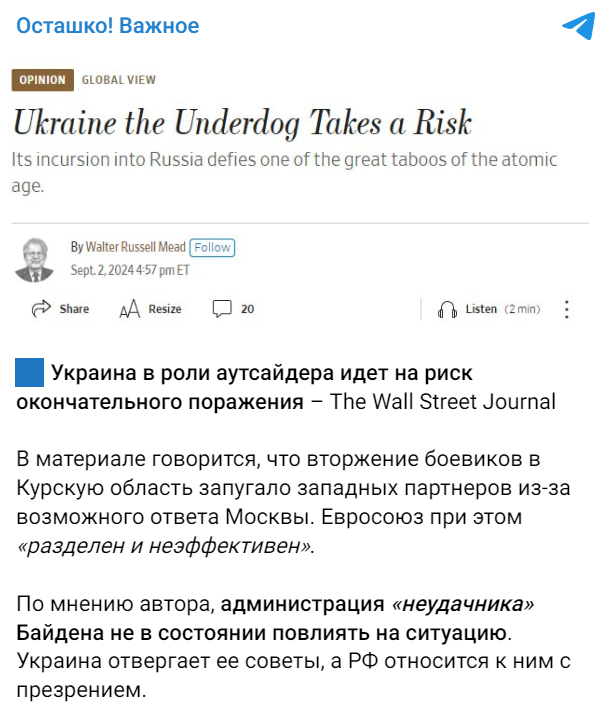Verification within Meta’s Third-Party Fact-Checking Program
Russian Telegram channels are spreading claims that The Wall Street Journal allegedly reported that Ukraine, as an underdog, is risking total defeat due to the Kursk operation. According to the post authors, the journalists stated that Western partners supposedly fear Moscow’s possible response to this Ukrainian Armed Forces operation.
However, this is false. The article does not mention that Kyiv is “risking total defeat.” The author states that if the operation forces Putin to redeploy troops not only to Kursk but also to other border areas for defense, Russia’s offensive potential will be reduced.
Screenshot of the post
The article “Ukraine the Underdog Takes a Risk” was published on September 2, 2024. It discusses how the August 6 operation by Ukraine’s Defense Forces in the Kursk region will not stop Putin from continuing the war, nor will it provide resources or strategic advantages to defeat Russia. However, the article does not state that Kyiv is “risking total defeat.” Columnist Walter Russell Mead actually argues that Ukraine’s decision to carry out the operation is likely justified. “Endlessly engaging in a losing positional war in the east of the country, while Ukraine’s faint-hearted Western supporters hesitate and debate, guarantees total defeat,” the article notes. On the contrary, the author argues that if Kyiv can force Putin to redeploy troops not only to Kursk but to all border areas to protect them from similar attacks, Russia’s advantage in manpower and its ability to sustain offensive operations will be significantly diminished.
Walter Mead highlights that the operation is significant for several reasons. This is the first instance of a non-nuclear country invading and holding territory in a nuclear state. Previously, it was believed that nuclear weapons would prevent anyone from daring to attack a nuclear-armed nation. However, Russia has not yet used such weapons against Ukrainian forces nor threatened their use during the ongoing Ukrainian operation.
Additionally, the author notes that this move reflects Ukraine’s new military strategy, showing that Kyiv no longer intends to listen to “timid Western strategic advice.” As a result, Ukraine concealed the planning of this attack from its Western partners. For Russia, the Ukrainian offensive also came as a surprise. Mead suggests that, in theory, Ukraine’s partners have the ability to provide it with the resources needed to achieve victory, but Kyiv no longer believes that the West will deliver on this. “The Biden team is too intimidated by Russian threats, the European Union is, as always, divided and ineffective, and the West as a whole remains under the illusion that Putin is ready to negotiate a peace that would allow Ukraine to join NATO and the European Union,” the article says.
Thus, through this operation, Kyiv hopes to boost Ukrainian morale and reduce Western fears of Russia. The offensive raises questions: Where exactly are Putin’s “red lines”? What would happen if Ukraine continued its offensive and doubled its control over Russian territory? Since the start of the full-scale invasion, Ukraine has repeatedly crossed the Kremlin’s so-called “red lines” — it sank the cruiser Moskva, attacked the Crimean Bridge in 2022, launched drone strikes on the Kremlin and Moscow in 2023, and used Western weapons on Russian soil. However, none of these actions led to the use of nuclear weapons, which Putin constantly threatens the West with.
Attention
The authors do not work for, consult to, own shares in or receive funding from any company or organization that would benefit from this article, and have no relevant affiliations


